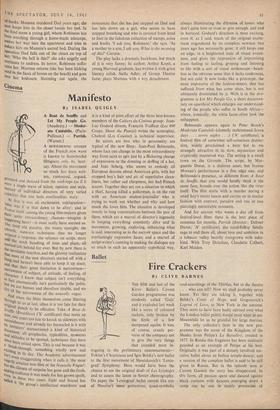Cinema
Manifesto
By ISABEL QUIGLY A Bout de Souffle and Let My People Go. (Academy.) — Moder- ato Cantabile. (Paris- Pullman.) — Parrish. (Warner.) A BEWILDERING amount of the French new wave is known to homebouhd filmgoers only by hear- say. About the movement so much has been writ- ten, rumoured, argued, 8°ssined and shouted from the roof-tops (as if it were a single wave of talent, opinion and style, instead of individual directors of very varied capacity) that one feels overfamiliar, wary. At first it was all excitement, exhilaration— 'bliss was it in that dawn to be alive'; and in Erailce itself, among the young film-makers given their quite extraordinary chances—imagine it naPPening here! --it must really have seemed so. The tired old pundits, the weary eyesight, the snlooth, outworn techniques that no longer aroused a response, the reliance on script, story and the stock handling of time and place, all seemed left behind for ever. But by now there is the inevitable reaction, and the gloomy realisation that most of the new directors started off with a bang and haven't been able to keep it up since; and that their great limitation is narrowness— narrowness of subject, of attitude, of feeling, of eharacter. I know that subject isn't everything, 1.1) fact cinematically isn't particularly the 'Point; tire We are human and therefore tirable, and we of the narrowness of the nouvelle vague. th And when the films themselves come filtering 'r.°118h to us at last, often it is too late for their s(irtginal punch to be effective. Take A Bout de n°141fte (Breathless) (`X' certificate) that turns up .,°w' two years too late to knock us sideways with idtstonishment and already (so barnacled is it with ds imitators' mannerisms) a kind of historical °cullient, all prophecies, typicalities, moments and attitudes to be spotted, techniques that have :nee been seized upon. This is sad because it was :x hreak-through, something wholly new and e,itin8 in its day. The Academy advertisement 4:an t even exaggerating when it calls it `the most k.gerlY awaited new film of the Nouvelle Vague'; _u aut the Climate of surprise has gone and the fresh, egvnlog audience it was made for has grown spoilt, calein in these two years. Sight and Sound has led it 'the group's intellectual manifesto' and it is a kind of joint effort of the three best-known members of the Cahiers du Cinema group: Jean- Luc Godard directs, Francois Truffaut (Les 400 Coups, Shoot the Pianist) writes the screenplay, Chabrol (Les Cousins) is technical supervisor.
Its actors are two who in personality are typical of the new films : Jean-Paul Belmondo, whose face can change in the most extraordinary way from saint to spiv just by a flickering change of expression or the donning or doffing of a hat, and Jean Seberg, who seems to embody all European dreams about American girls, with her cropped boy's hair and air of superlative clean- liness, her rather sad chirpiness, her bad French accent. Together they act out a situation in which a thief, having killed a policeman, is on the run with an American student-journalist' who is trying to work out whether and why and how much she loves him. The situation is developed mostly in long conversations between the pair of them, which are a marvel of director's ingenuity in keeping everything constantly alive and in movement, growing, exploring, enhancing what is said, interesting us in the narrow space and the everlastingly expressive faces; and a marvel of script-writer's cunning in making the dialogue say so much in such an apparently superficial way, always illuminating the dilemma of lovers who don't quite love or trust or give enough. and end in betrayal. Godard's direction is most exciting, even if, as I said, much of the original excite- ment engendered by its complete newness two years ago has necessarily gone; it still keeps one on edge, in a heightened state of visual aware- ness, and gives the impression of improvising from feeling to feeling, groping and listening to life with a sort of visual stethoscope—heart- less in the obvious sense that it lacks tenderness, but not cold. It now looks like a prototype. the most impressive of the fashion-setters, that has suffered from what has come since, but is not ultimately diminished by it. With it in the pro- gramme is Let My People Go, a short documen- tary on apartheid which enlarges our understand- ing of the people who suffer in South Africa— where, ironically, the white faces often look the unhappiest.
Belmondo appears again in Peter Brook's Moderato Cantabile (clumsily rechristened Seven days . . . seven nights . . .) CA' certificate), a festival film of somewhat self-conscious distinc- tion, widely proclaimed a bore but to me strangely attractive in its slow, mysterious and cryptically mannered way. The setting is a small town on the Gironde. The script, by Mar- guerite Duras, is a dubious asset; but Jeanne Moreau's performance is a fine edgy one, and Belinondo's presence, so different from A Bout de Souffle that you would hardly think it the same face, broods over the action like the river itself. The film starts with a murder during a small boy's music lesson and carries on in similar fashion with contrast, paradox and one or two piercingly memorable moments.
And for anyone who wants a day off from festival-level films there is the best piece of nonsense for months, Parrish (director: Delmer Daves; `A' certificate), the rural-folksy family saga to end them all, about love and ambition in a tobacco valley heavily overgrown with suke- bind. With Troy Donahue, Claudette Colbert, Karl Malden.


































 Previous page
Previous page